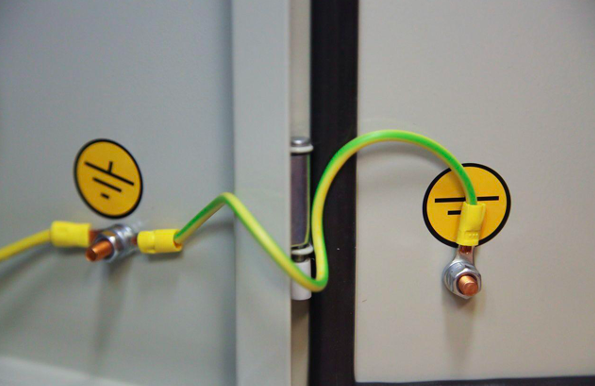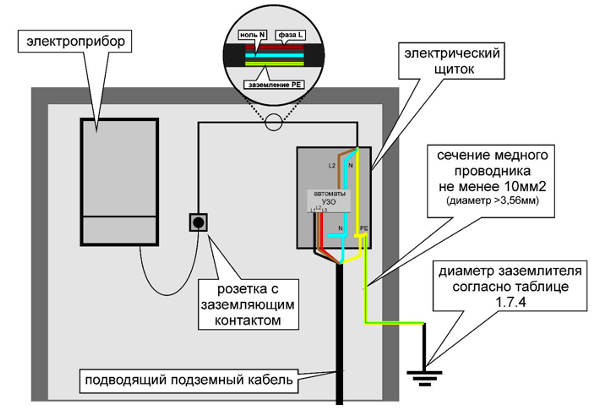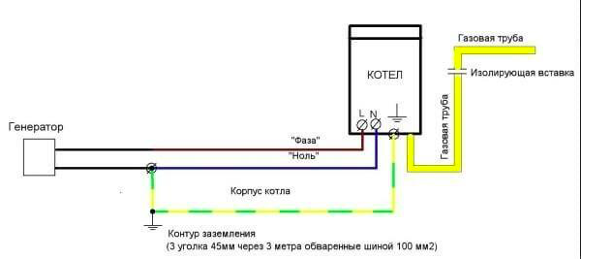Grounding for a gas boiler in a private house: how to do it, norms and regulations

Using a gas boiler in a private home requires strict adherence to safety measures, among which proper grounding for a gas boiler plays a key role. This aspect is important not only to guarantee safety, but also to comply with current regulations and standards. In this article we will look at how to properly organize grounding, what standards should be followed and what documents need to be completed.
The content of the article
Why is grounding needed and how to do it

How to make grounding for a gas boiler is a question that requires the attention of every owner of a private house with gas heating. First of all, grounding provides protection against the possible flow of electric current through the boiler body, which can be fatal.
To perform grounding, specialized materials are used, such as copper rods and grounding cables, which are connected to the gas boiler and then buried in the ground.The process must be performed by a qualified specialist who knows how to ground a gas boiler in a private home.
Alternative grounding option
In addition to traditional methods, there is an alternative grounding option for a gas boiler in a private house, which may be applicable in certain situations. This method can be particularly useful where standard methods are not suitable due to site conditions, materials or the design of the boiler itself.
Depth electrodes
One effective alternative method is the use of depth electrodes, which are immersed to a significant depth. This method is used if how to ground a heating boiler in a private house becomes a problem due to unfavorable soil types.
Conductors with a large contact area
Another method is to use conductors with a large area of contact with the ground, which can significantly improve the grounding characteristics of a gas pipeline in a private home. This method is especially effective where space is limited or minimal excavation is required.
Advantages:
- Efficient in difficult soil conditions or limited space.
- Reduced material costs when using conductors with a large contact area.
- Possibility of use in specialized or limited conditions.
Flaws:
- Complexity of calculations and design.
- High cost of specialized equipment.
- The need for strict compliance with the rules and regulations for approval of the act for grounding a gas boiler.
Thus, alternative grounding methods can be very effective, but require a more careful approach and, possibly, the involvement of highly qualified specialists. They can be used in difficult conditions and provide a high level of safety, but do not forget about the need for strict compliance with all existing rules and regulations.
Norms and Regulations
Boiler room grounding codes and regulations are especially important for safety. According to the law, grounding must provide a certain resistance, which is calculated in advance taking into account the characteristics of the boiler room and electrical network. Grounding a gas boiler in a private house, the standards also include mandatory maintenance and periodic checks of the condition of the grounding device.
An important document confirming the quality of the work performed is the grounding certificate for the gas boiler. This act must be completed jointly with a licensed specialist after all necessary measurements and checks have been carried out.
What are the penalties for unauthorized grounding?
Unauthorized grounding of a gas boiler in a private house in Russia is regulated by law and provides for administrative liability. Unauthorized connection and use of gas is regulated by Article 7.19 of the Code of Administrative Offenses of the Russian Federation (CAO). According to this article, violation of the rules may result in the following fines:
- for individuals from 3,000 to 4,000 rubles;
- for officials from 6,000 to 8,000 rubles;
- for legal entities from 60,000 to 80,000 rubles.
Also, in addition to the Code of Administrative Offences, there are “Rules for the use of gas at home”, approved by Order of the VO “Rosstroygazifikatsiya” dated 04/26/1990 N 86-P. These rules state that the population is prohibited from unauthorized gasification of a house (apartment, garden house). They also prohibit the rearrangement, replacement and repair of gas appliances, cylinders and shut-off valves.
Grounding other elements of the heating system
No less important is the grounding of the gas pipeline in a private house and the grounding of the gas pipe. Don't forget about heating radiators. Grounding of heating radiators is also carried out in order to prevent electrical leakage and possible accidents.
List of key steps for grounding:
- Selecting a qualified specialist to perform the work.
- Calculation of grounding device parameters.
- Selection of materials and components for grounding.
- Direct execution of grounding work.
- Measurement of resistance and other grounding parameters.
- Drawing up the act and other documentation.

Errors when creating grounding for a gas boiler
When it comes to grounding for a gas boiler, making a mistake can be critical. Below we will look at the most common mistakes. They can not only entail administrative liability, but also pose a threat to life and health.
Incompetent performance of work
One of the most serious mistakes is to entrust the process of how to ground a gas boiler in a private house to an unlicensed specialist. Also, do not try to do the work yourself without the appropriate skills and knowledge. This not only breaks the law, but also increases the risk of accidents.
Incorrect calculation of parameters
Neglecting the stage of detailed calculation of the air exchange of the pool and the parameters of the grounding device may lead to the fact that the system will not effectively perform its functions. The grounding resistance must be accurately calculated taking into account all factors. Take into account the type of soil and the characteristics of the boiler room and electrical network.
Absence or incorrect execution of the act
The absence of an act for grounding a gas boiler or its incorrect execution can lead to administrative or even criminal liability. In addition, in the event of an accident, the insurance company may refuse to pay, citing the lack of an officially issued report.
Errors in creating a grounding system are fraught not only with legal consequences, but also pose a significant risk to life. Therefore, this process should be approached as responsibly as possible, observing all norms and recommendations.
Conclusion
Proper grounding for a gas boiler in a private home is not just a legal requirement. This is also the key to safe and efficient operation of the heating system. Pay attention to every aspect. Start with choosing materials and drawing up the act. Then proceed to choosing a specialist. After all, this is the only way you can ensure maximum security and long-term performance of your system.




